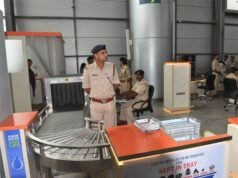Warming world, which is already recognised as one of the leading public health threats that humanity is facing today, is now making it harder to stop the spreading of drug-resistant superbugs.
The World Health Organization refers to Antimicrobial resistance (AMR) as the “silent pandemic”. Antimicrobial resistance is an often overlooked and growing global health crisis.

AMR has been previously declared as one of the top 10 global threats to human health by the United Nations health agency. The health agency says that an estimated 1.3 million people die every year directly due to resistant pathogens.
According to the WHO, the ‘1.3 million’ figure can “soar dramatically” without urgent action. This can lead to higher public health, economic and social costs and pushing more people into poverty, especially in low-income countries.
Antimicrobials, which include crucial antibiotics and antivirals, serve as medications to prevent and treat infections in both humans and animals. However, their excessive use and improper application stand as the primary instigators of the Antimicrobial Resistance (AMR) phenomenon.
AMR emerges when microorganisms like bacteria, viruses, fungi, and parasites develop the capability to persist or proliferate despite the presence of drugs intended to eliminate them.
Compounding this issue, studies indicate that climate change is exacerbating the AMR crisis through various channels.
“Climate change is fundamentally significant because of its profound impact on our planet. There is growing concern that as temperatures increase, there is a higher likelihood for the easier spread of infectious diseases, including antibiotic-resistant bacteria,” Tina Joshi elaborated, an associate professor of molecular microbiology at the University of Plymouth in the U.K., speaking to CNBC via videoconference.
“AMR bacteria are often referred to as a ‘silent pandemic.’ It’s termed ‘silent’ because it garners little attention — and it’s truly disheartening that this critical issue isn’t receiving the attention it deserves,” Joshi lamented.
Broken AMR diagnostics pipeline and urgent calls for action
The UN Environment Program’s report titled “Bracing for Superbugs,” released earlier this year, underscores the role of the climate crisis and other environmental factors in shaping the emergence, propagation, and transmission of Antimicrobial Resistance (AMR).
The report highlights that higher temperatures are linked to an accelerated spread of antibiotic-resistant genes among microorganisms. Additionally, the ongoing disruption caused by extreme weather events and increased pollution fosters conditions conducive to the development of resistance in pathogens.
Recent scientific observations indicating that 2023 is highly likely to set a new record as the warmest year on record underscore the impact of extreme heat fueled by the climate crisis. This intensification of extreme weather events poses significant challenges.
Robb Butler, WHO Europe’s director of communicable diseases, environment, and health, emphasized the urgent global health challenge posed by AMR. He highlighted the substantial health costs, estimated at approximately 1.5 billion euros ($1.6 billion) annually in the EU, along with productivity losses.
Butler expressed hope that the upcoming COP28 climate conference in the United Arab Emirates would serve as a platform for policymakers to acknowledge the connection between the climate crisis and AMR. The summit, hosted by the UAE from Nov. 30 to Dec. 12, presents an opportunity for global attention to this critical association.
Addressing the lack of attractiveness for industries to invest in antimicrobial development due to high costs and risks, Butler stressed the necessity of raising awareness about AMR and ensuring it receives adequate attention, particularly in the wake of the COVID-19 pandemic.
The dire need for industry engagement in tackling AMR was highlighted, especially in developing innovative antimicrobial drugs. Butler expressed concern about the lack of incentives for industry leaders to invest in AMR research, potentially leading to a dearth of effective antibiotics in the future.
Tina Joshi from the University of Plymouth echoed concerns about the broken AMR diagnostics pipeline, stressing the urgent need for policymakers to rejuvenate and prioritize this process. She highlighted the economic viability issue, asserting that the current situation is destabilizing the antimicrobial sector.
Possible next pandemic?
Thomas Schinecker, CEO of Roche, warned about the potential fallout from not learning crucial lessons from the COVID-19 pandemic, suggesting that failure to prepare adequately might lead to serious ramifications for the AMR health crisis. He emphasized the importance of learning from past experiences to confront future pandemics, including the possibility of antibiotic-resistant bacteria causing the next pandemic.
In essence, these experts underscore the urgency of addressing the connection between climate change and AMR, advocating for increased awareness, policy intervention, and industry engagement to combat this pressing global health crisis.






